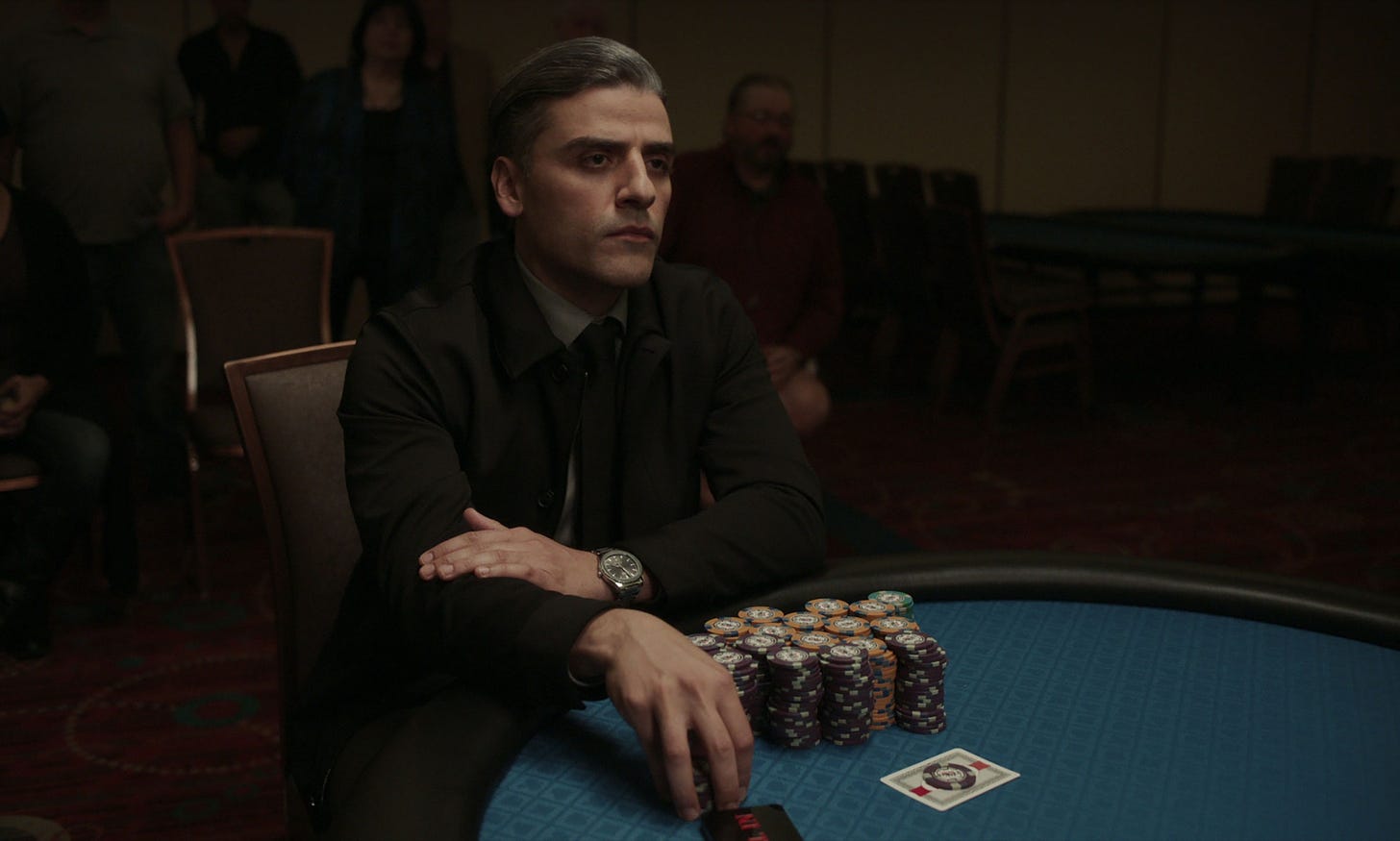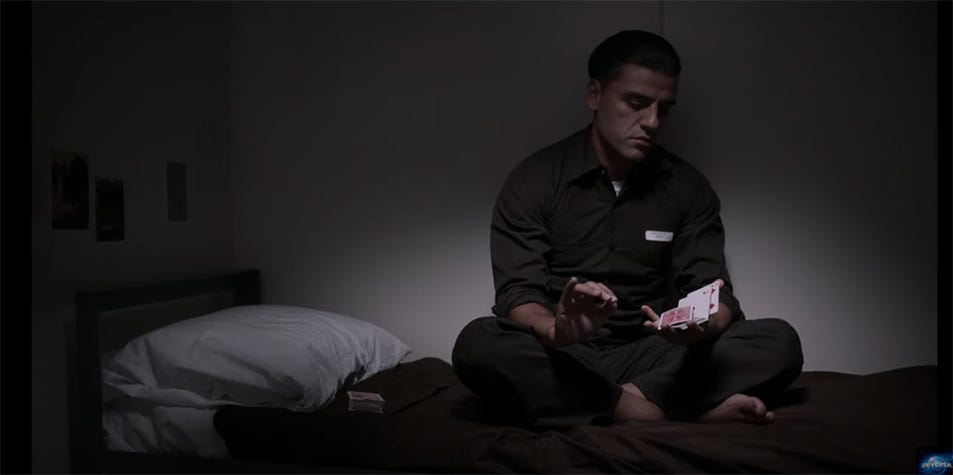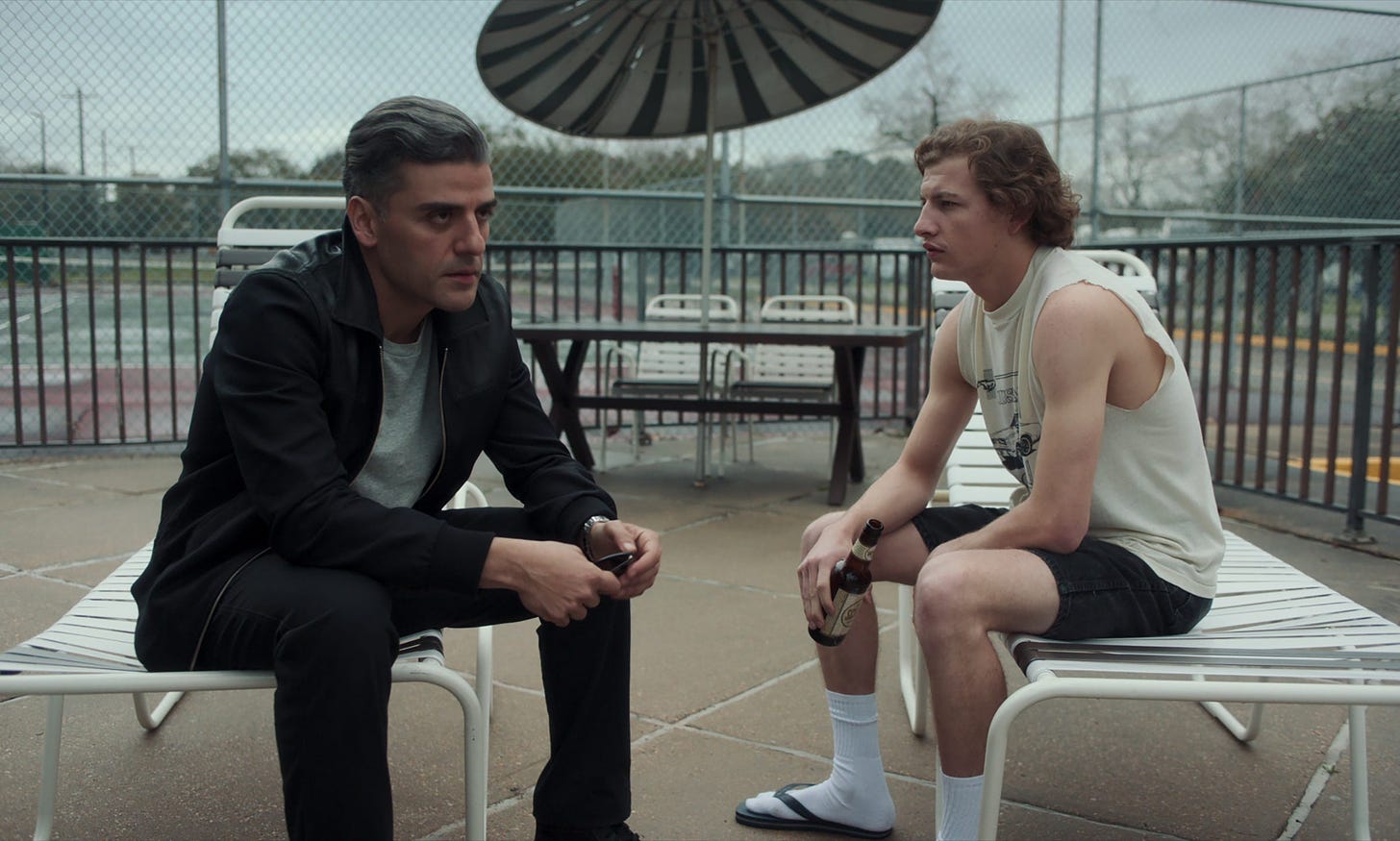The Card Counter (2021)

Unbridled rage has been at the core of almost every script that Paul Schrader has written since his career boomed in the 70s with his success with Taxi Driver (not his first script but the one that rocketed his career). Since writing the iconic story of god’s lonely man he has gone to explore a multitude of similar characters, all masking their guilt and repression with an often atypical career (drug dealer, gigolo, poker player). In 1978 Schrader picked up the camera himself for the first time to direct Blue Collar. A film which follows three working class men who plan to steal from their Union after facing economic hardships. Claims that he wasn’t planning on making a left wing film feel strange considering how visceral its examination of labour, race and class are. Alongside its condemnation of Union corruption and the way capitalism purposefully causes cultural and racial divides. 43 years later Schrader has directed over 20 films (and written a handful more for fellow New Hollywood stars like Martin Scorsese and Brian De Palma). Unlike a lot of directors who get more comfortable with age, Schrader seems to be only getting more radical. Such as his 2014 film, Dying Of the Light, which got cut without his permission - likely due to the experimental nature of the editing and the anti war narrative of the film. The Card Counter sees Schrader return to both experimental film making and a plot that involves war, but with this time he had the final cut.
Starring Oscar Isaac as the titular card counter, named William Tell (a role in which he was clearly born to play). A man wracked with guilt over his involvement with the Abu Ghraib prison during the Iraq War. For William, despite going to prison, he has no salvation. How could you when you have committed what many people consider the ultimate sin? It is prison that forms our classic Schrader character. A tremendously lonely man, confined by walls both physical and mental, stuck in a limbo state with no sense of escape. After his release, William is now a gambler. The film never makes it clear whether or not he is addicted. He claims he is merely passing the time with something he is good at. Signs of simply Stockholm syndrome appear. For the windowless walls and unknown players are simply an extension of his own experiences at prison. The poker sequences are excellent and reminded me a lot of the pickpocketing sequence in the much influential Bresson film - Pickpocket. Some people might find the Bressonian approach that he has implemented many times over to be stale at this point but Schrader constantly has a way of keeping the skeletal idea fresh.

At its core the film is ultimately about guilt but the usage of Abu Ghraib shifts it from regular Schrader terrority of personal guilt, to more of a story about national guilt or even - international. However, The Card Counter differs from many films about the Iraq War. It is relentlessly uncompromising in the graphic depiction of torture; the flashback sequences are incredibly similar to the genuine photographs which forces viewers to remember just how bleak and miserable this event was. Releasing this in America on the anniversary of 9/11 is incredibly commendable. In many war films (such as Jarhead or The Hurt Locker) the directors attempt to condemn war and the people in charge. But not necessarily the individual soldiers; for they are just ill fated cogs in the machine of war. Schrader takes that concept and ultimately snaps it in two. Even showing us the brutal process of being turned into a harbinger of torture for the United States military. William Tell knows what he did is unforgivable and that no amount of prison or salvation will ever redeem him. The camera shows no remorse for the actions of any of the characters on screen - we are left to make up our own minds about what we are shown on screen.
Make no mistake however, this is an incredibly angry film, maybe one of the angriest films made in recent years. In First Reformed (A film I have previously written about here) Schrader was angry. He was angry at the corporations who pollute the world, he was angry at the politicians who ignore it but most of all he was angry at the catholic church. A place that preaches love for God’s creation but does nothing to prevent the ecological destruction facing us. Ultimately that burning anger cannot be released and is internalised as guilt. The guilt of both discovering and accepting that, as a single human, you are incapable of changing anything. It is in the same vein that The Card Counter is formed. Schrader’s resentment of war, the military-industrial complex and the all people involved rolls over into a feeling of hopelessness and guilt. Feeling ultimately powerless as horrible acts of violence and injustice happen in the name of your very own Nation, or in the name of your dearly beloved Faith. Both films are about carrying the weight of guilt both from yourself and external forces you cannot control.

The relationship between Cirk and William reminded me at times of the one between the main characters in Clint Eastwood’s A Perfect World. A film in which an escape convict (played by Kevin Costner) kidnaps a fatherless boy before striking up a father-son relationship with him. In that film Costner manages to instill lessons into the boy about masculinity, fatherhood and criminality. We get a cathartic release knowing that these lessons have been passed down. The Card Counter goes in a very different direction and it is with this notion of William’s failed teachings that brings out the deep rooted nihilism of Schrader’s film. Not only are the so called “war generation” fucked from taking part and witnessing such inhuman acts but their children are too. Trauma and violence is carried down and it is out of the hands of humans to be able to control that. The point at which William realises that Cirk hasn’t taken his advice but instead has relapsed back into violence is ultimately heart sinking. Salvation hasn’t been achieved. There is no remorse coming for him. The only thing taking away from this is the tonal shift at the ending. We get a glimmer of hope from William when he is visited by his new lover La Linda (played brilliantly by Tiffany Haddish). It would have been good to see some sort of subversion of his classical Pickpocket riff but ultimately the intense cynicism of the film perhaps would have been too much.
In an age where filmmakers and executives are assuming the audiences to be dumber and dumber as the years go on; The Card Counter is a breath of fresh air. We are not told how to feel or how to react. Music isn’t an overbearing force trying to steer your mood one way or the other. Camera placements aren’t trying to highlight certain elements or put a spin on a scene. Schrader lays the plot out bare for the viewers and allows us to determine the right from the wrong. Not only that but the film's content is brutal and uncompromising. There aren’t many filmmakers today willing to create such a brash film about cyclonic violence, war and guilt in such an open way as we see here. Unlike a lot of older film directors Paul Schrader has successfully managed to keep up with present political discourse. Tackling issues that are still deeply resonant, including a subtle critique of student debt. Sure, he might be 75; but he is making far more radically and politically aggressive films than most new directors who claim to be progressive.
